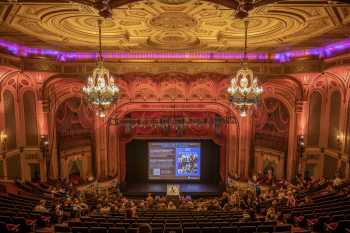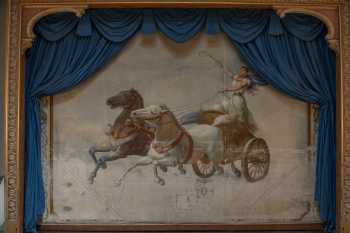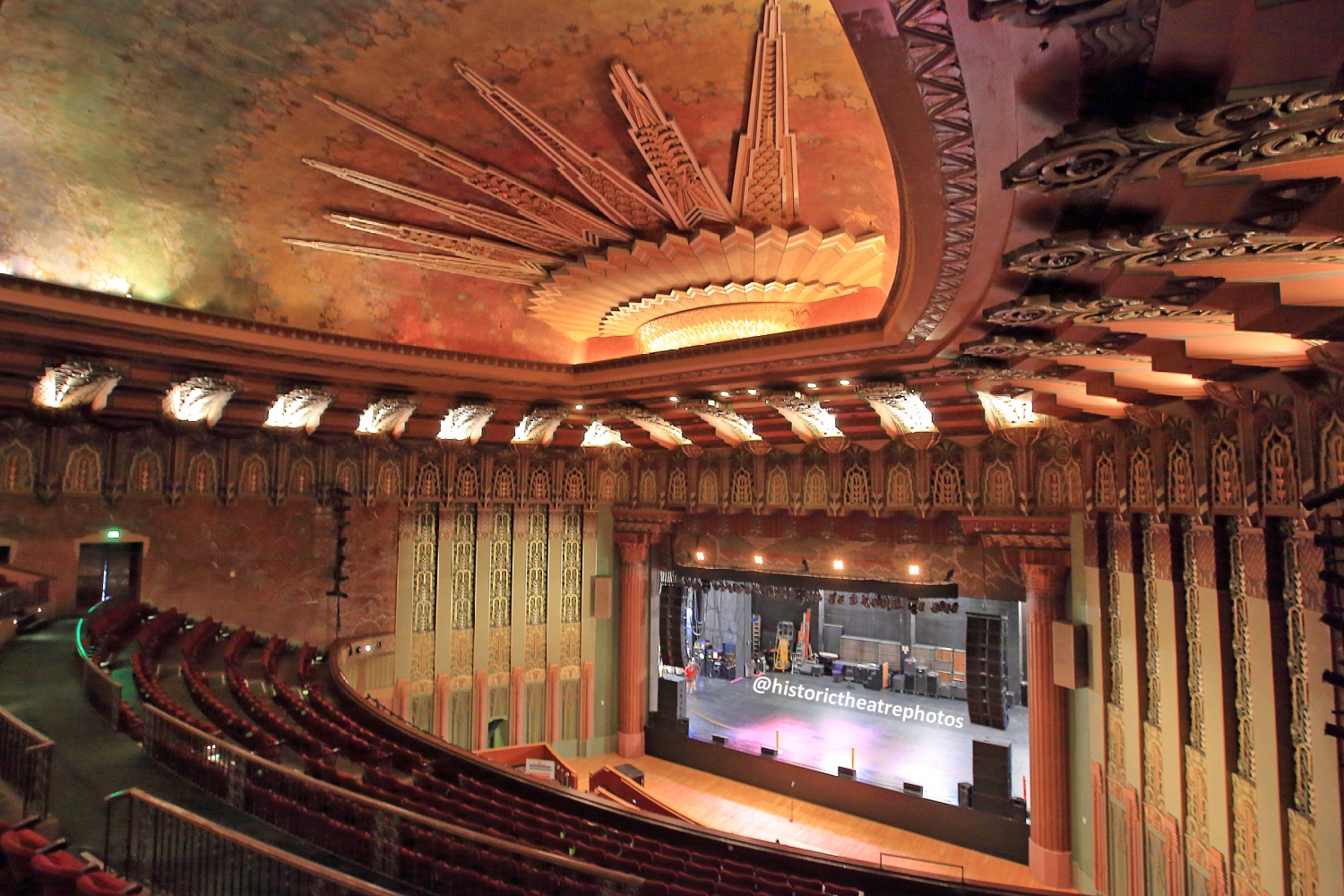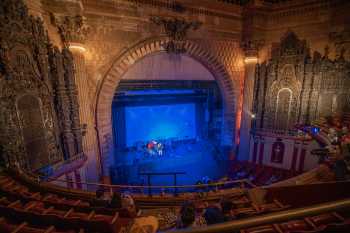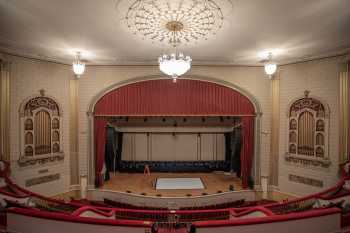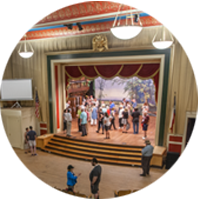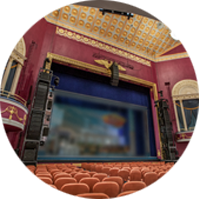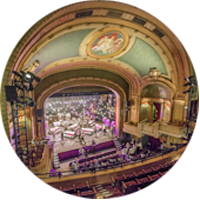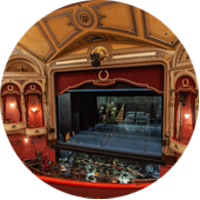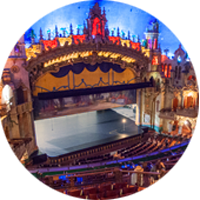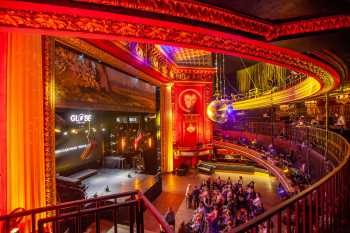- Photoshoots can be squeezed into 45 minutes minimum but ideally take 1.5 to 3 hours, depending on the size of the venue (not all the time is spent in the auditorium).
- No special lighting is required, and no local power supply is needed.
- Equipment is nothing more than a professional handheld camera with flash – no lights, power requirements, or big stands.
- No specialist/technical staff are required on your part.
- You’ll get a copy of all photos, at full resolution, to use forever – for free!
- Working around visiting companies is not a problem.
- Recent clients include Ambassador Theatre Group (both UK and US), Live Nation, Jam Theatricals, Goldenvoice, the Broadway Theatre Group, and the UK Capital Theatres group.
There isn’t much prep required as I don’t use any heavy equipment nor require special lighting setups.
Your technical staff are not needed for the photoshoot unless there are specifics required by your theatre, or we’ve agreed to have technical staff operate special features to be photographed such as a historic house curtain, act drop, or fire curtain, or other stage machinery.
Moving non-essential items ahead of time which don’t enhance the look of a space, whether in the lobby, auditorium, or a lounge (e.g. trash cans, stanchions, easels, signs) will help make the photos look more tidy and make your venue look at its best.
Past experience has shown that it’s beneficial to let your technical staff know I’ll be on-site, just in case the correct lights are not switched-on or a curtain/drop is down when it should be up. While my aim is to not require any support from on-site technical staff you may still wish to let them know that I’ll be visiting!
Recent clients: who else has collaborated with Historic Theatre Photos?
- Ambassador Theatre Group (US: Hudson Theatre, New York; Majestic Theatre and Charline McCombs Empire Theatre, both in San Antonio, Texas; UK: Bristol Hippodrome).
- Live Nation (Aztec Theatre, San Antonio; Warner Theatre, Washington DC; The Wiltern, Los Angeles).
- Jam Theatricals (National Theatre, Washington DC).
- Goldenvoice (Shrine Auditorium and the Fonda Theatre in Los Angeles).
- Broadway Theatre Group (the Los Angeles, Palace, State, and Tower theatres in Los Angeles).
- Capital Theatres (King’s Theatre and Festival Theatre in Edinburgh, UK).
- Plus over 40 additional independent theatres and movie palaces in the US and UK.
If time is tight I can cover the main areas in 45 minutes, however 1.5 to 3 hours, depending on the size of the venue, is ideal to ensure full coverage of your theatre. On average half the time is spent in the auditorium and the other half is spent covering other areas Front- and Back-of-House.
In terms of photographic equipment there are no lights or big stands used, so that I minimize the impact on your theatre’s day-to-day operations.
Generally speaking, the auditorium is the focal point of the photoshoot and where the most time will be spent. It’s usually best to start here in case time constraints crop up. I will shoot at all levels of the auditorium, both toward the stage and from the front looking back into the auditorium. Additionally some shots from the very front of the Stage, into the auditorium, really help viewers understand the relationship between the onstage talent and the audience. Even if general Stage access is not possible, taking these key shots from the front of the Stage is really useful.
Access to additional areas:
- Front of House areas including lobbies and lounges. These shots will help you promote your theatre by showcasing lounge facilities and suchlike.
- Backstage. Looking across an empty Stage with the auditorium in the background is ideal; if you have a show loaded-in I can work around that and the visiting company’s setup. It is great to be able to get some technical shots such as from a Fly Floor or similar. These afford viewers a rare glimpse of the “magic” used to stage a show, not to mention the complexities.
- Back of House areas such as Trap Room, Dressing Rooms, and Projection Booth / Followspot Box. Historic theatres and movie palaces often have a lot of history hiding in the Booth/Box, such as covered-up ports and old equipment, all of which helps highlight the historic nature of your venue. Personal items, such as would be found in Dressing Rooms, will not be photographed.
If your theatre has areas of specific interest (e.g. historic murals, unique plaster features, historic act drops, house curtain or fire curtain) let me know ahead of time so we can ensure it’s covered in the photoshoot. Although I’ll have researched your theatre before arriving onsite, you’ll know its features much better than I do! Your theatre’s unique features are what makes your theatre stand out from the crowd and are particularly useful to showcase on social media.
If you have a show loaded-in at the time of the photoshoot I’ll ensure a number of photos without the visiting company’s setup are taken, in case there are concerns about parts of their design or machinery being published online. For any photos which can’t avoid this, I can – and it isn’t my preference but I fully understand it is sometimes a requirement – blur and/or darken out these areas.
Lighting: I can work with most types of lighting harsh floodlights, sometimes called Cleaners’ Lights, are not suitable. Usually regular houselights are best in the auditorium as they’re designed to be sympathetic to the architecture of the space. If you have architectural lighting in place, say to highlight features such as the prosc arch, sounding board, or ceiling centerpiece, we may need to be able to tone them down as the brightness for the human eye is different to that seen through a camera lens.
In terms of artificial lighting I’ll use a flash when necessary (it will be color-corrected to the ambient lighting) and if production staff are working at the time I will call out its use.
Having worked in technical theatre for over twenty years (see theatre.mikehume.com for my portfolio) I’m well versed in theatre safety, HSE/OSHA best practice, backstage etiquette, and what things not to touch! I am happy to work with a chaperone/guide during the photoshoot or to be left on my own...your venue, your call.
Post-processing of the photos (color balance, cropping, etc) normally takes three to four weeks dependent on the size of the photoshoot and other projects in the pipeline. If I have multiple projects running timescales can extend to eight weeks for the larger-scale photoshoots. If you have specific deadlines please let me know and I’ll make things fit your needs.
Once post-processing is complete you’ll be supplied with a link to retrieve all the photos at full resolution, along with a thumbnail index file (a “Photo Finding Aid”) of all the photos for easy browsing. This is normally done on Dropbox, but whatever the mechanism, it won’t require software other than a web browser to reach the online website. Photos will be provided in JPG High/Maximum Quality format. Original RAW (Canon CR2 format) files can be provided upon request.
Below is a condensed example of a Photo Finding Aid:

I’ll share all photos with you, not just the “glamour” shots, on the basis that it affords you pictures for any use, whether it be featured shots on a website or print brochure, a photo of a backstage stairwell for an employee handbook, or documentation of your theatre’s history for archival purposes.
The number of photos taken will depend on the size of the theatre, level of interior architectural decoration and/or areas of special interest, and access to additional areas such as backstage. Examples of recent photoshoots, to give you a sense of numbers, are as follows:
| Location |
Duration |
Photos |
Disk Space |
Comments |
|
30 minutes |
33 |
95MB |
Small theatre with access limited to Auditorium, Front of House, and Stage floor. |
|
1.5 hours |
97 |
295MB |
Large theatre with access to all areas. |
|
1.5 hours |
170 |
610MB |
Large theatre featuring ornate Auditorium with access to all areas. |
|
3 hours |
240 |
1.3GB |
Large theatre featuring ornate Auditorium and extensive Front-of-House areas with access to all areas including Stage. |
|
5 hours |
320 |
1.8GB |
Major photoshoot of a large theatre with highly detailed decoration throughout Auditorium and Front-of-House. Closed-off areas (e.g. segregated Balcony) and all Stage facilities. |
Before release of the photos I’ll confirm usage license terms with you in writing by email. Here’s the wording of a sample usage license:
This Photo License Agreement (this “Agreement”) is made as of [Effective Date] by and between Historic Theatre Photos / Mike Hume and [Client]. The parties agree as follows:
Client is granted a perpetual license to use the supplied photos for promotional use at zero cost, and in any form of media, so long as photos are credited, preferably as an active hyperlink, when published. Example credits are:
For use of multiple photos within a single item e.g. printed brochure, a single credit which notes all photos used is acceptable, as opposed to a credit for each individual photo.
Aside from cropping and minor adjustments (e.g. conversion to black and white, blurring for background images, minor color edits) to suit publication requirements, photos should not be significantly altered from how they were provided without consultation.
Should Client work with third parties who wish to use any of the supplied photos that is subject to the same licensing arrangements, unless payment is being made for use of any photos.
For commercial use either by Client or by a third party please contact Historic Theatre Photos / Mike Hume prior to publication to discuss applicable rates.
Historic Theatre Photos / Mike Hume will not share, publish, or license photos taken inside your theatre without your permission, except for publishing on the Historic Theatre Photos website, posting to the Historic Theatre Photos social media channels, and posting to related interest public Facebook groups (e.g. Theatre Architecture).
Historic Theatre Photos / Mike Hume remains the copyright holder of the photos supplied to you.
Photos of your theatre will be published on the website “Historic Theatre Photos” (www.historictheatrephotos.com). The aim of the website is to raise awareness of historic and culturally significant theatres around the world, with a view to documenting them through photography for the historic and preservation record, as well as for future generations.
I will construct a page on my website about your theatre. The page will consist of an overview and written history of your theatre, historic documents/drawings, tour/visit information, links to further reading on the internet and in print, and the best of the photos shot at your theatre. Should you wish to approve this page before it goes live just let me know and we’ll collaboratively work on any edits you suggest. If there are specific photos you don’t want published that will absolutely be respected.
The “best of the bunch” photos from your theatre will be posted from time to time on the website’s social media channels (Facebook  , Instagram
, Instagram  , and Twitter
, and Twitter  ) to attract users to visit both your and the website’s social media channels and websites. Your theatre’s social media channel(s) will always be included in posts of your theatre. The aim is to promote awareness of these beautiful, historic, and significant theatres while at the same time helping advertise events taking place in your theatre.
) to attract users to visit both your and the website’s social media channels and websites. Your theatre’s social media channel(s) will always be included in posts of your theatre. The aim is to promote awareness of these beautiful, historic, and significant theatres while at the same time helping advertise events taking place in your theatre.
Social media is a powerful tool in our industry so I would ask that your theatre’s Marketing and social media team hook up with Historic Theatre Photos’ social media channels on Facebook  , Instagram
, Instagram  , and Twitter
, and Twitter  .
.
All the best, and I look forward to collaborating with you very soon!

Mike Hume
Photographs copyright © 2002-2026 Mike Hume / Historic Theatre Photos unless otherwise noted.
Text copyright © 2017-2026 Mike Hume / Historic Theatre Photos.
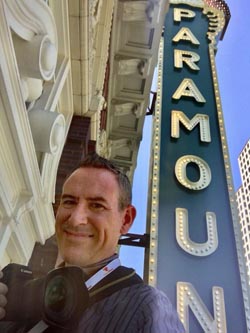
 (U.S. Pacific timezone unless otherwise advised).
(U.S. Pacific timezone unless otherwise advised).